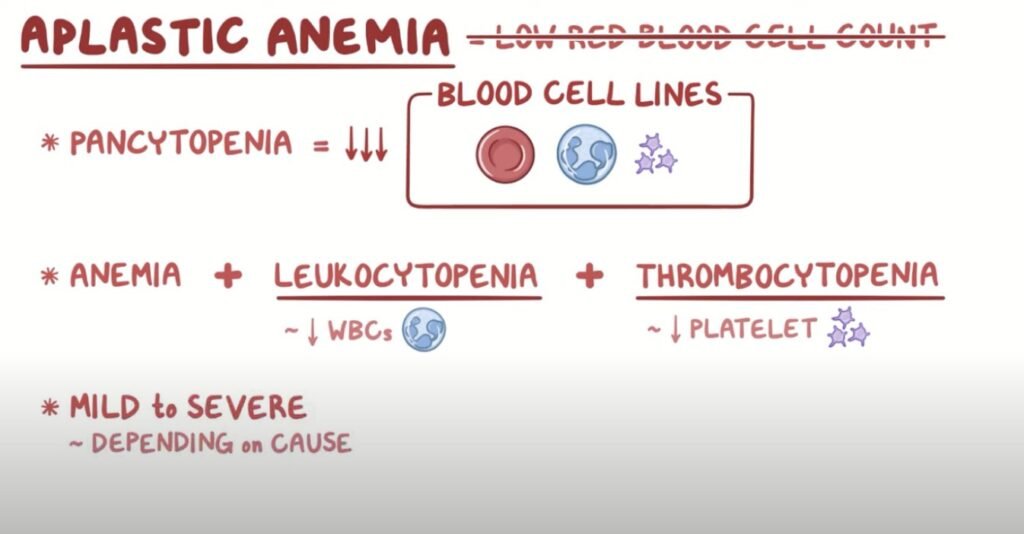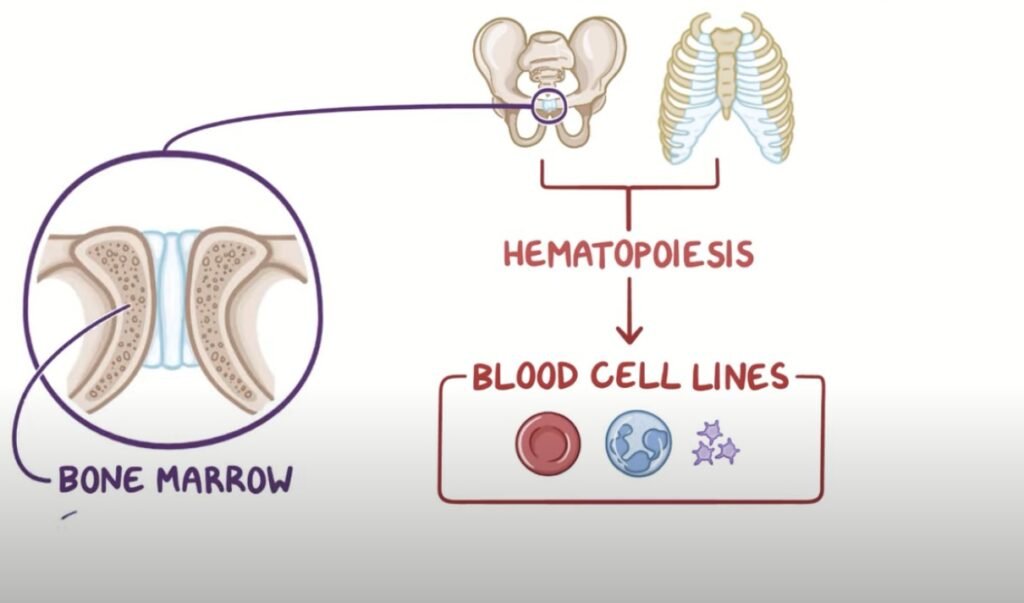Introduction to Aplastic Anemia
aplastic anemia is a rare type of anemia characterized by a deficiency of red blood cells, white blood cells, and platelets. Unlike other forms of anemia, which may be caused by iron deficiency, idiopathic aplastic anemia stems from a bone marrow problem where the bone marrow fails to produce enough blood cells. Aplastic Anemia, characterized by a deficiency of red blood cells and coloration in the blood, is a prevalent condition affecting many individuals worldwide. Understanding the causes and treatment options for anemia is crucial for maintaining overall health and well-being.
Understanding Blood Composition
Blood is composed of various components, with red blood cells playing a vital role in transporting oxygen to body tissues. The production of red blood cells relies on essential nutrients such as iron, proteins, and vitamins, particularly folic acid and Vitamin B12. There is currently no known way to prevent idiopathic aplastic anemia. Unlike other forms of anemia, it cannot be prevented by iron supplementation. However, paying attention to symptoms and seeking prompt medical attention can help manage the condition effectively and prevent complications.
Symptoms of Aplastic Anemia
Symptoms of idiopathic aplastic anemia are similar to those of general anemia and may include dizziness, excessive fatigue, sensitivity to cold temperatures, weakness, rapid heart rate, irritability, paleness, shortness of breath, nosebleeds, bleeding gums, easy bruising, and susceptibility to infections. Aplastic Anemia manifests through physical symptoms like fatigue, weakness, and shortness of breath, along with psychological symptoms such as poor memory and mental depression. Recognizing these signs is essential for early intervention and treatment.
Causes of Aplastic Anemia
The exact cause of idiopathic aplastic anemia is often unknown, but it is believed to involve damage to the bone marrow. Potential causes include autoimmune conditions, reactions to certain medications or chemicals, exposure to radiation or chemotherapy, certain viruses, and, rarely, inherited factors. Aplastic Anemia can result from various factors, including inadequate red blood cell formation due to dietary deficiencies or underlying health conditions. Blood loss from injuries or medical conditions like heavy menstruation can also lead to anemia. Additionally, emotional strain and certain medications may contribute to anemia development.

Treatment Approaches
Diagnosis begins with a blood test to detect low levels of red blood cells, white blood cells, or platelets. A bone marrow biopsy may be necessary to confirm the diagnosis and assess the severity of the condition. Idiopathic aplastic anemia can be classified as acute or chronic based on the speed of onset and severity. Diet plays a crucial role in preventing and treating anemia, with emphasis on consuming natural organic iron sources and protein-rich foods. Including vitamin-rich foods like fruits and vegetables, especially those high in ascorbic acid, can aid in iron absorption. Water treatments, cold baths, and physical exercises are also beneficial in managing anemia symptoms. Treatment varies depending on the severity of the condition. Mild cases may not require treatment, while moderate cases may involve stopping certain medications or avoiding potential toxins. Blood and platelet transfusions are common for moderate to severe cases. Severe cases may require a bone marrow transplant, particularly in younger individuals with compatible donors.
Understanding Anemia Medications: Types, Treatments, and More
Anemia is a condition characterized by a deficiency of red blood cells, which affects the body’s ability to transport oxygen efficiently. While some types of anemia may not require medication, others respond well to specific treatments, including various supplements and injections. In this article, we’ll explore the different types of medication used to treat anemia, along with other treatment options and some frequently asked questions.
Types of Medication for Anemia
- Iron Supplements: Iron deficiency anemia occurs when the body lacks sufficient iron to produce hemoglobin, the protein responsible for carrying oxygen in red blood cells. Iron supplements, such as ferrous sulfate, can help replenish iron levels in the body. Vitamin C supplements may also be recommended to enhance iron absorption.
- Erythropoiesis-Stimulating Agents (ESAs): ESAs are synthetic versions of erythropoietin (EPO), a hormone that stimulates red blood cell production. They are used to treat anemia caused by conditions such as chronic kidney disease, where low EPO levels lead to decreased red blood cell production.
- Vitamin Supplements or Injections: Megaloblastic anemia, often caused by deficiencies in vitamin B12 or folate, can be treated with supplements to stimulate the production of healthy red blood cells. In cases of pernicious anemia, where vitamin B12 absorption is impaired, vitamin B12 injections are necessary for treatment.
- Medication for Underlying Conditions: Treating the underlying condition contributing to anemia is essential. Medications may be prescribed to manage inflammatory diseases, viral infections, or certain types of cancer that affect red blood cell production.
Other Treatments for Anemia
In addition to medication, other treatments for anemia may include:
- Dietary Changes: Adjusting your diet to include more iron-rich foods or sources of vitamin B12, folate, and vitamin C can help address nutritional deficiencies contributing to anemia.
- Blood Transfusion: In cases of severe anemia due to blood loss or certain types of inherited anemia, a blood transfusion may be necessary to replenish red blood cell levels.
- Bone Marrow Transplant: For severe forms of anemia, such as aplastic anemia or those associated with bone marrow diseases, a bone marrow transplant may be considered to promote the growth of healthy new blood cells.
OTC Medication for Anemia
Some over-the-counter supplements can help treat anemia caused by low iron levels or vitamin deficiencies. Iron, vitamin B12, and folate supplements are available without a prescription. However, it’s important to consult with a healthcare professional before starting any OTC supplements to ensure they are safe and appropriate for your condition.

Does Anemia Cause Weight Loss or Weight Gain? Understanding the Relationship
Anemia is a condition characterized by a low level of healthy red blood cells in the body, affecting its ability to transport oxygen efficiently. Many wonder whether anemia can lead to weight loss or weight gain. Let’s explore this topic in detail.
Research on Anemia and Weight Changes
Research indicates an association between obesity and anemia, particularly iron deficiency anemia. This may be due to increased levels of a hormone called hepcidin, affecting iron absorption. However, weight changes can result from various underlying causes of anemia or its effects on activity and appetite levels.
Other Causes of Unexpected Weight Changes
Weight changes can stem from factors beyond anemia. Conditions like hyperthyroidism, inflammatory bowel disease, cancer, depression, and anxiety can lead to weight loss, while hypothyroidism, polycystic ovary syndrome, and certain medications can cause weight gain.
Symptoms of Anemia
Common symptoms of anemia include fatigue, shortness of breath, weakness, pale skin, and heart palpitations. Additional symptoms may include headaches, mouth sores, hair loss, and changes in taste or cravings.
Diagnosis and Treatment of Anemia
To treat anemia, healthcare professionals identify the underlying cause, which may be nutritional deficiencies, autoimmune diseases, or inherited conditions. Treatment options include supplements, injections, or medications to boost red blood cell production.
Managing Anemia-Related Weight Changes
For those experiencing weight changes due to anemia, maintaining a balanced diet rich in proteins, healthy fats, and fruits is crucial. Regular physical activity and consulting healthcare providers for safe exercise recommendations are also important. In cases of unintended weight loss, consuming enough calories to meet energy needs and seeking guidance from health professionals on meal planning are essential.
When to Seek Medical Attention
Persistent and unexplained weight changes warrant medical attention. If experiencing symptoms of anemia or noticing significant weight fluctuations, consulting a healthcare provider for proper diagnosis and treatment is advised.
Conclusion
In conclusion, Aplastic anemia is a prevalent condition that requires attention to dietary habits, lifestyle factors, and medical interventions. By adopting a balanced diet, incorporating essential nutrients, and engaging in suitable treatment approaches, individuals can effectively prevent and manage anemia. While anemia can impact weight due to its effects on appetite and activity, various factors contribute to unexpected weight changes. Understanding the relationship between anemia and weight fluctuations and seeking medical guidance for proper diagnosis and management are crucial for overall health and well-being.

FAQs
- Can anemia be treated without medication? Some types of anemia, particularly those caused by nutritional deficiencies, may be managed through dietary changes alone. However, severe or chronic cases often require medication or other treatments.
- What are the common symptoms of anemia? Common symptoms include fatigue, weakness, dizziness, shortness of breath, pale skin, and rapid heartbeat.
- Are there any risks associated with anemia medications? While anemia medications are generally safe when used as directed, they may have side effects or interact with other medications. It’s important to follow your doctor’s recommendations and report any concerning symptoms.
- How long does it take for anemia medications to work? The time it takes to see improvement depends on the underlying cause of anemia and the specific medication being used. Some individuals may notice a difference within weeks, while others may require longer-term treatment.
- Can anemia medications be taken during pregnancy? Certain anemia medications, such as iron supplements, are commonly prescribed during pregnancy to address iron deficiency anemia. However, it’s essential to consult with a healthcare provider for personalized recommendations.